Epic Games President Tim Sweeney criticizes the Find My service, controlling the Apple Vision Pro glasses using brain signals, new colors and a redesigned camera in a leaked image of the iPhone 16, Apple’s earnings report today, and Steve Jobs’ auction offers an Apple 1 computer, a bomber jacket, and an original iPhone Sealed and hundreds of thousands of dollars more, and other exciting news on the sidelines...

Steve Jobs Auction Offers Apple 1 Computer, Bomber Jacket, Sealed Original iPhone, and More
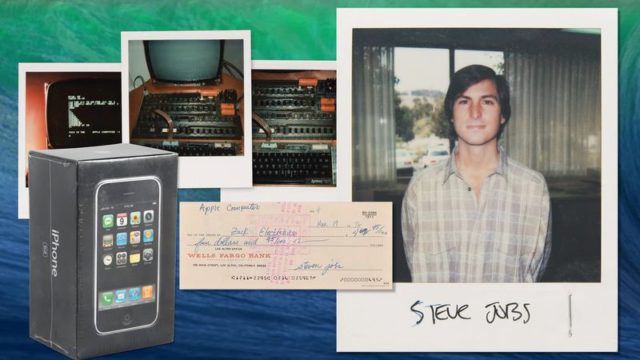
An auction is currently underway titled “Steve Jobs and the Apple Revolution,” featuring a rare collection of items related to Apple and its late founder, Steve Jobs. One of the most notable items on offer is a working Apple-1 computer, expected to sell for more than $300.
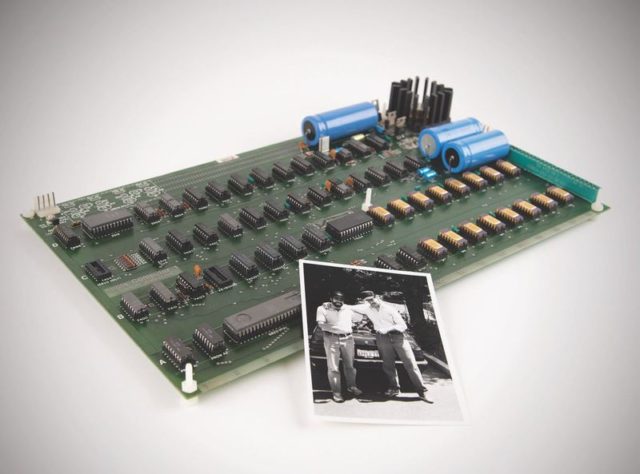
Also included in the display are original Polaroid photographs that Jobs used to display the Apple-1 computer. The photos are expected to sell for more than $30.
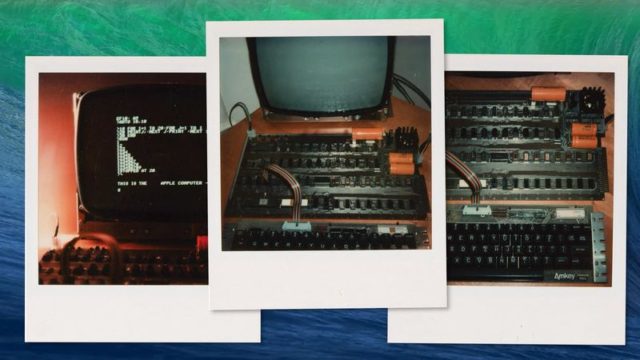
In addition to an original iPhone with a capacity of 4 GB in its original condition and still in its box that was never opened, its price is expected to reach more than 80 thousand dollars.
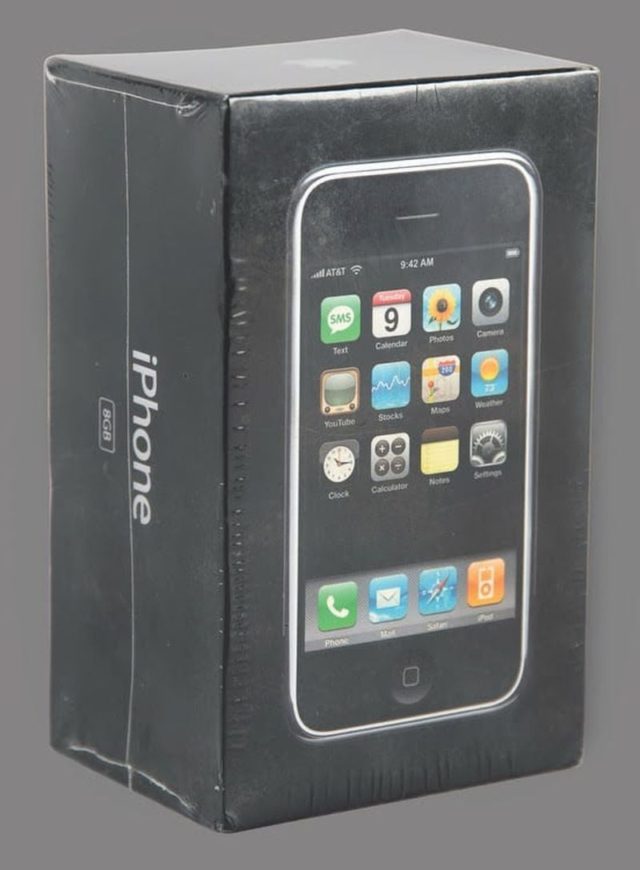
The auction also includes a leather jacket called a bomber, which was originally designed for military pilots during World War II to protect them from the cold in unheated aircraft cockpits, and then became a popular fashion in the 1960s and 1970s.
Jobs wore a bomber jacket in a famous photo taken in 1983, showing him pointing his middle finger towards the logo of IBM, Apple's rival at the time. This image has become iconic and expresses Jobs' defiant and revolutionary personality in the world of technology. This jacket is expected to sell for a large sum of up to $75.
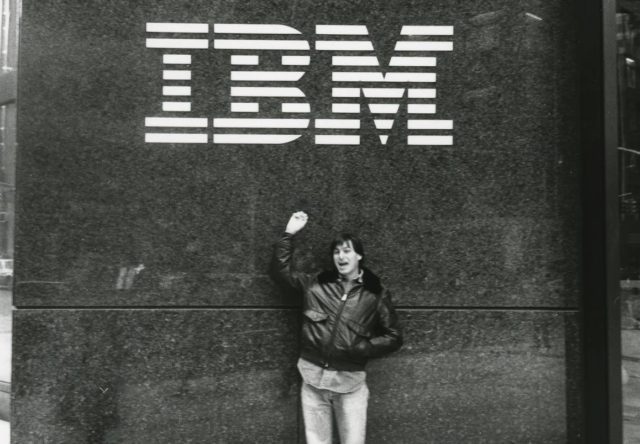
The collection also includes checks signed by Steve Jobs, his Polaroid ID NeXT ID badge, and a business card. The collection also includes a 1972 high school yearbook, old magazines with his photo on the cover, and classic Mac computers.
iPhone driver's licenses are now available in Ohio
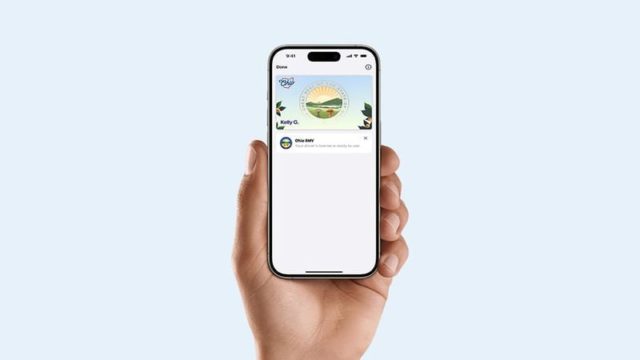
iPhone and Apple Watch users in Ohio can now add ID cards and digital driver's licenses to the Wallet app on their phones, providing a convenient alternative to physical cards. Ohio is the fifth state to add support for digital identities in the wallet app, following Arizona, Maryland, Colorado and Georgia. Although Apple announced plans to add support for digital IDs in September 2021, implementing the feature requires support from states, and so far implementation has been slow.
IDs and driver's licenses stored in the wallet app can be used at TSA checkpoints at select US airports, including Baltimore, Washington, Phoenix, Denver and Atlanta. These digital identities can also be used to prove age or identity in some companies and places, but adoption of this functionality is still limited. Ohio says businesses and organizations with “compatible mobile ID readers” can accept digital IDs.
What to expect from Apple's quarterly earnings report today
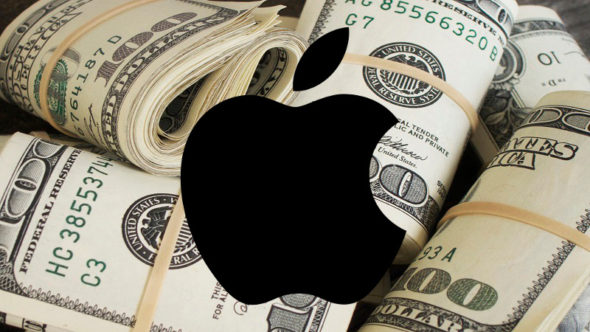
Apple will announce its financial results for the third quarter of fiscal year 2024 today, Thursday, August 1, at 11:30 pm Cairo time. During this quarter, which extended from March 31 to June 29, Apple launched several new products, including the iPad Pro and iPad Air with M4 and M2 chips, respectively, and the Apple Pencil Pro, and also opened the door for pre-orders for the Apple Vision Pro Eyeglasses. Eight additional countries. The Wall Street website expects Apple to achieve revenues of about $84.5 billion, an increase of 3% over the same period last year.
CEO Tim Cook and CFO Luca Maestri will hold a conference call with analysts to discuss the results. The conference will be broadcast live on Apple's investor relations website. The company's current quarter runs until September 28, and Apple has not yet announced any new products during this period. Apple (AAPL) stock is currently trading at around $223, down from its 52-week high of $237.23.
We will provide you with a detailed article once the earnings call ends, God willing.
The iPad Pro's Tandem OLED screen technology could extend to future Apple Glasses
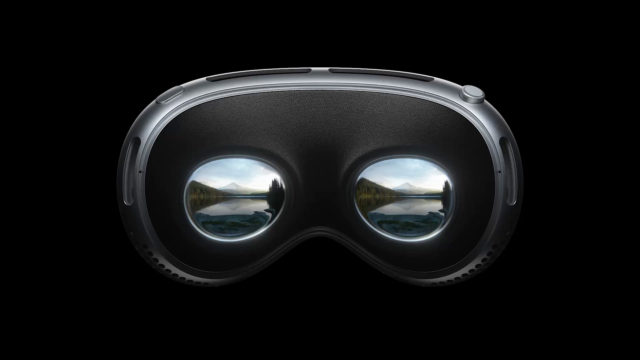
According to a report from Korean Sisa Journal, LG and Samsung have developed prototypes of micro-OLED displays that use dual OLED (Tandem OLED) technology. This development may pave the way for the use of this technology in a future version of Apple's Vision Pro glasses. Although it is not clear when mass production of these displays will begin, the second generation Vision Pro is not expected to be launched before late 2026, allowing enough time to prepare this technology for commercial use.
Dual OLED technology, which Apple recently used in the new iPad Pro, features two organic light-emitting layers stacked together, providing higher brightness, better power efficiency and longer life compared to single-layer OLED displays. Use of this technology in a future version of Vision Pro may provide these same advantages. Currently, the Vision Pro uses two 4K micro-OLED displays from Sony, but the new technology could enable the next generation of glasses to have brighter, more energy-efficient displays within the next few years.
iPhone 16 Pro may come in a new bronze color
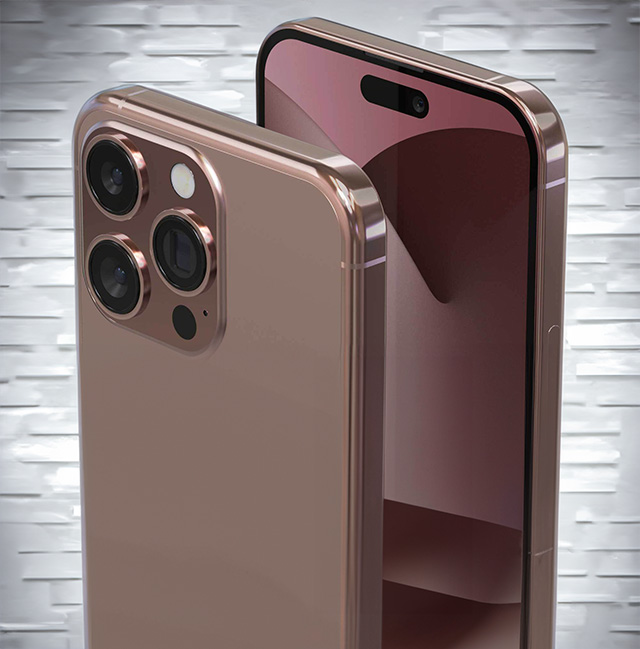
Recent rumors indicate about IPhone 16 Pro Until Apple may replace the titanium blue color, which it used in the iPhone 15 Pro devices, with a new color similar to pink, gold, or bronze. According to one of the leakers on the Weibo platform, the new color of the iPhone 16 Pro Max resembles a “tone of bronze,” while the surrounding frame retains the appearance of titanium. It is reported that Apple plans to use an improved process for finishing and coloring titanium, which may result in a more shiny appearance than the brushed aluminum finish on the iPhone 15 Pro models.
The iPhone 16 Pro and Pro Max are likely to get slightly larger screens. In addition to the new color, the iPhone 16 Pro is expected to be available in other colors, including black, white, silver, gray, or “natural titanium.” Rumors indicate several design differences and other new features expected in this series.
iPhone 16 colors and redesigned camera revealed in a leaked image
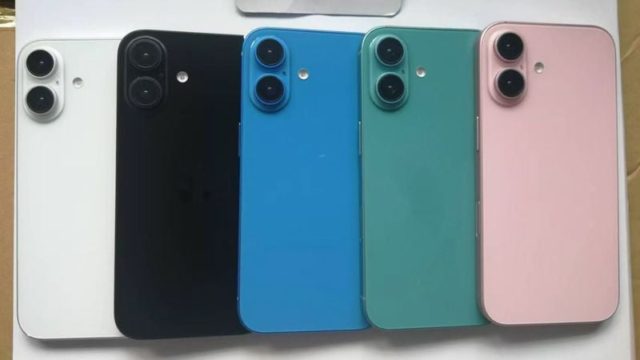
Leaker Sonny Dickson revealed an image showing prototypes of the iPhone 16 phones, showing the new colors and the modified design of the iPhone 16 and iPhone 16 Plus cameras. The image shows five new colors that match analyst Ming-Chi Kuo's expectations, which are white, black, blue, green, and pink.
It seems that Apple is moving towards a brighter and more saturated color palette for the standard models this year, compared to the current iPhone 15 colors.
As for the iPhone 16 models, they will come with a 6.1-inch and 6.7-inch screen, and Apple is planning a new arrangement of the camera lenses vertically, instead of the previous diagonal arrangement. This change will likely allow standard models to capture spatial video for Vision Pro glasses, a feature that was previously limited to the iPhone 15 Pro models.
The iPhone 16 and iPhone 16 Plus are expected to include an A18 chip, 8 GB RAM, and a new “Capture” button on the right side for photos and video, in addition to an Actions button.
OpenAI introduces advanced, more natural voice mode for GPT chat
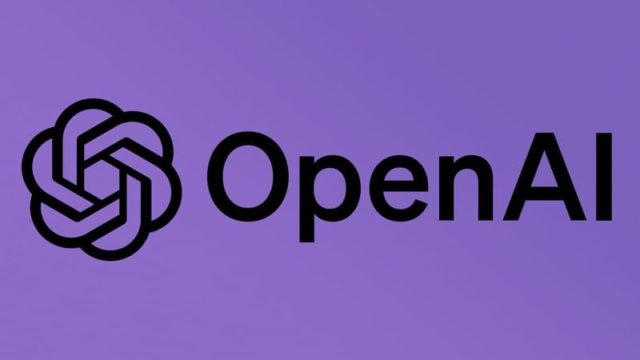
OpenAI has announced the start of rolling out the paid “Advanced Voice Mode” feature to a limited number of ChatGPT users. This feature allows for more natural, real-time conversations with the AI, as replies can be interrupted and humor and sarcasm are understood. Unlike the current system, this new mode does not need to convert speech into text and then back into audio, resulting in faster and smoother interactions.
After a previous controversy over the use of voices resembling celebrities without their permission, OpenAI has improved the safety and quality of voice conversations. Advanced mode uses four preset voices and prevents imitation of celebrity voices. Controls have also been put in place to prevent requests for violent or copyrighted content. Invitations will be sent to selected users to try the feature, with plans to gradually expand access, to be made available to all paid service subscribers next fall.
iPhone 16 Pro will support Wi-Fi 7 widely
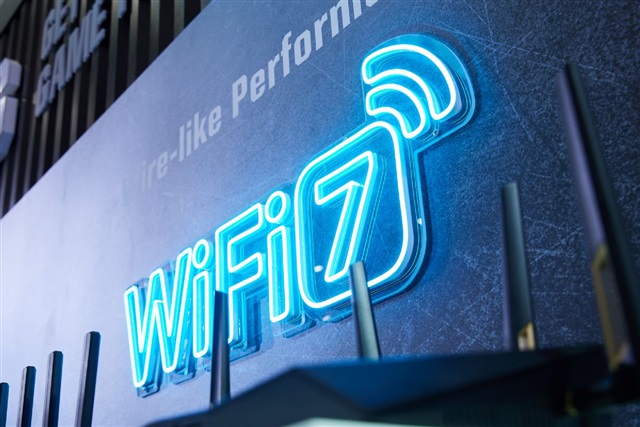
The iPhone 16 Pro and iPhone 16 Pro Max are expected to support Wi-Fi 7 technology, which will enable them to send and receive data across the 2.4 GHz, 5 GHz, and 6 GHz bands at the same time, leading to faster Wi-Fi speeds. , lower response time, and more reliable connection. Wi-Fi 7 is expected to provide theoretical data transfer speeds of more than 40 Gbps, 4 times faster than Wi-Fi 6E. Analyst Jeff Poe had previously indicated support for Wi-Fi 7 in these devices, which are expected to be released on September 12.
Controlling Apple Vision Pro glasses using brain signals

Apple announced a new development in Apple Vision Pro glasses technology, as they can now be controlled using what is known as the Brain-Computer Interface. This is thanks to integration with neurotech startup Synchron's Brain-Computer Interface (BCI).
This innovative technology allows users to control the glasses via brain signals, providing an unprecedented interactive experience. This technology relies on reading electrical signals from the brain and translating them into commands that the glasses can implement.
This technology was used successfully by Mark, a 64-year-old man with amyotrophic lateral sclerosis (ALS), who was able to control the cursor on the Vision Pro to play the Solitaire card game, watch Apple TV, and send text messages without using his hands.
Brain-computer interface technology allows people with severe motor disabilities to control digital devices using their thoughts. The device is implanted in the blood vessels on the surface of the brain through a simple operation. The device reads movement signals from the brain and sends them wirelessly to other devices, allowing them to be controlled without the need to use the hands. Synchron plans to conduct larger studies to expand the use of this technology.
Apple uses Google Tensor chips to develop Apple's intelligence features
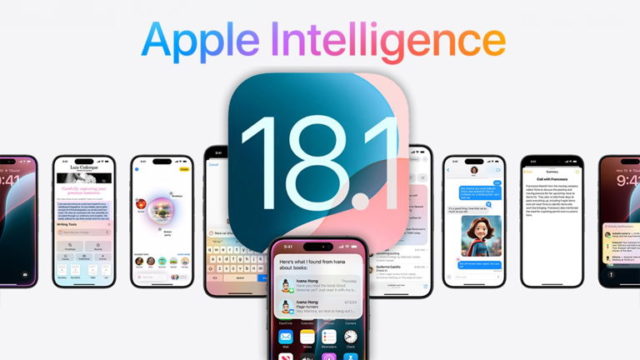
Apple used Google-developed Tensor Processing Units (TPUs) instead of Nvidia's common graphics processing units (GPUs) to build two core components of Apple Intelligence. According to a new research paper published by Apple, the company relied on 2,048 TPUv5p chips and 8,192 TPUv4 processors to build artificial intelligence models. This decision is striking given Nvidia's dominance in the AI processor market, and indicates a deliberate choice to favor Google's technology.
Apple explained that the TPUs allowed it to efficiently train large, complex AI models. Apple announced plans to invest more than $5 billion in improvements to artificial intelligence servers over the next two years, which will enhance its capabilities in this field and reduce its dependence on external device providers. Apple also emphasized its commitment to responsible data practices, noting that it did not use any user data to train its models.
OpenAI has announced the launch of SearchGPT
◉ SearchGPT is an AI search prototype designed to deliver “fast and timely answers” with “clear and relevant sources.” SearchGPT is currently available to a small group of users and publishers, with OpenAI seeking feedback on the product. The prototype is tentative at the moment, but the best features will be integrated into ChatGPT in the future.
SearchGPT is designed to combine conversational capabilities with live information from the web, making it faster and easier to find what you're looking for. SearchGPT can respond to questions with up-to-date information from the web and answer subsequent questions in a conversational way, including shared context with each additional inquiry. OpenAI intends to support a thriving ecosystem of publishers and creators, providing clear links and sources in responses to help users discover publisher sites.
Should Google be afraid? Tell us in the comments
Miscellaneous news
◉ Epic Games CEO Tim Sweeney criticized the “Find My” service, calling it “a very scary surveillance technology” that “should not exist.” Sweeney explained that several years ago, a Mac was stolen from his car, and years later, he used the “Find My” service to locate the device, which showed him where the thief lived. His comments sparked controversy, as the service is designed to locate lost or stolen devices. Sweeney emphasized that tracking the location of the device means tracking the person in possession of it, which violates the right to privacy. He pointed out that the recovery of devices must be done through the law and not individually. After discovering how the service worked, he stopped it on all of his devices!
◉ Emergency SOS service via satellite has expanded to Japan with the iOS 17.6 update released yesterday, according to Apple. Now Japanese customers with an iPhone 14 or later can use Emergency Satellite to communicate with emergency services even when a Wi-Fi or cellular connection is not available.
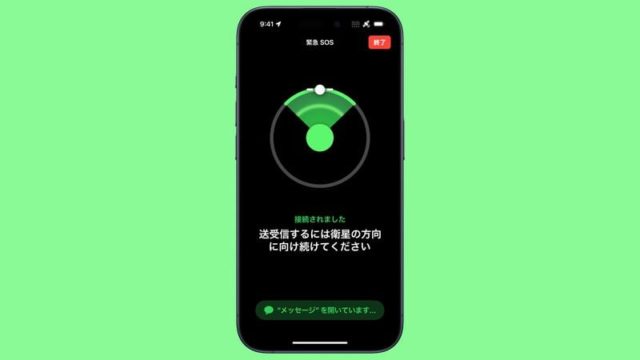
◉ LG Display is expected to be the secondary supplier of OLED screens for the iPhone SE4 models, which will be released next year. The new iPhone SE will come with a design similar to the iPhone 14, with an OLED screen, a facial fingerprint, a USB-C port, and an action button. BOE will be the main supplier of OLED displays, while LG Display will provide backup support. Mass production of the device is expected to begin in October this year, with a launch in spring 2025.
◉ The Spanish Competition Authority has launched an investigation into Apple's App Store for possible anti-competitive practices, which could result in significant fines. The National Commission for Markets and Competition (CNMC) announced the investigation over concerns that Apple may impose unfair commercial terms on developers who distribute their apps via the platform. If these allegations are confirmed, Apple could face fines of up to 10% of its total global annual revenue, which could amount to billions of euros. This investigation comes in the context of increased regulatory scrutiny of major technology companies in Europe, as the European Commission previously imposed a fine on Apple worth 1.84 billion euros in March due to anti-directive practices in music streaming applications.

◉ The social network This setting is enabled by default for all users, much to the dismay of many users. Users can deactivate this setting via the X website, but not in the app yet.
X uses this data to improve Grok's understanding of human language and develop his ability to provide accurate and relevant responses. It also aims to enhance Grok's sense of humor and ensure balanced and politically unbiased answers. Grok is currently available to premium X subscribers, and is said to be trained on “the world’s most powerful AI training suite.”
Sources:
1 | 2 | 3 | 4 | 5 | 6 | 7 | 8 | 9 | 10| 11| 12| 13| 14| 15 | 16 | 17 | 18 | 19 | 20


There are some tools that are not compatible with the screen reader. We need an update to solve the problem
Hello world of iPhone iOS 📱! Yes, some tools may not be compatible with screen readers, and we understand how important this feature is to you. Apple is always striving to improve its products and services, and I believe it will take your feedback into account in future updates. Keep monitoring updates and news about Apple through iPhoneIslam, we are always here to keep you updated! 🚀🍎
Thanks for the carefully selected information
Why is the iOS 18.1 Beta 1 update not showing up for me, given that my iPhone 18 Pro Max is running iOS 4.5 Beta XNUMX?
Peace be upon you, regarding deactivating Grok on the X platform, it is available on the web and on the application, and you said that it cannot be deactivated from the application. I have a verified account on X and I myself deactivated Grok from the application, but previously yes it was only available on the web
Peace be upon you, iSalah 🍏! Thanks for your clarification, there may be a new update that allowed Grok to be deactivated from the app. We appreciate you sharing this information with our community, we always love to learn from our smart readers like you! 😁👍
What is the benefit of gold coins in the Phone Islam application?
Hello world of iPhone iOS 🙋♂️, gold coins in the iPhone Islam application are used to activate some additional features in the application, such as activating features in the tools. Always collect them! 🥇📲👌
I will give you more information. The gold coins in the Phone Islam application are used for the tools in the application and cannot be replaced, of course. For example, you want to use the Test Me tool, which is a tool located in the Tools tab that allows you to create a simple competition consisting of six questions. Of course, this performance requires one gold coin. For example, you have a video downloading tool that requires two gold coins. You get the gold coins when you read an article every day. The point is not in the article but on the day. If you open an old article on Phone Islam and this is the first article you open on the day, then this tool is published. A special article for today: You will not get another tool. Did you understand how?
In fact, what the artificial intelligence told you is actually to activate some features of the tools. Such as downloading videos.